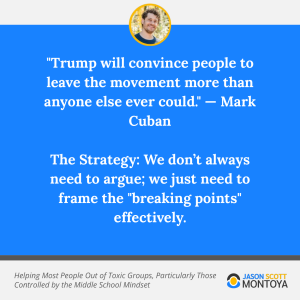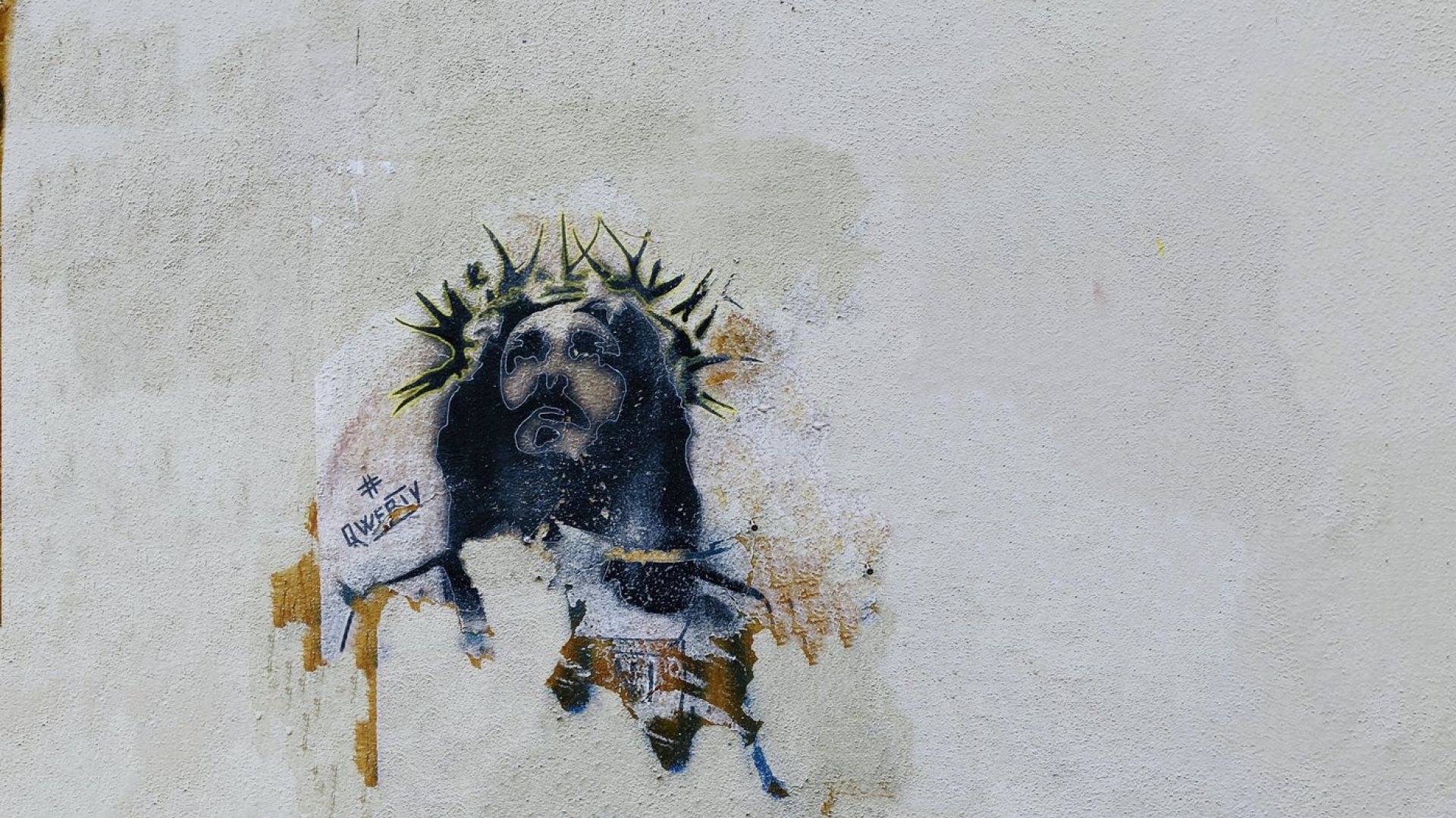
Helping Most People Out of Toxic Groups, Particularly Those Controlled by the Middle School Mindset

Life is Hard. Business is Challenging. The World is Uncertain.
Leaders, freelancers, and entrepreneurs: Get stories & systems, for navigating the challenges, in your inbox.
"The character of the leader defines the character of the movement." - David French, French Friday: The Nazi Rot on the Right
When a group is toxic because the leader is toxic, how do you help people escape this toxic political group or movement? It's one thing for someone inside of it to want to leave, but what if they want to stay or at least don't want to rock the boat by leaving?
Teasing out the answer to these questions is my goal for this post, a continuation of my exploration of the middle school mindset (level 2 in Constructive Developmental Theory) in a leader, as well as how that immaturity in an adult can capture and control a group.
While my focus is on the toxicity of my political party, Republicans, these insights do apply to any group that has been dominated by the imperial mindset (level 2 maturity in Constructive Developmental Theory).
In a post from earlier this year, I provided commentary on Mark Cuban's talk at the Principles First Conference. One thing he said that stuck out to me is that Trump will convince people to leave the movement more than anyone else ever could. And eleven months in, that seems to be ringing true. So, we have numerous opportunities to point people to the reasons while framing them in the most effective way possible.
For those who want to understand how to help free people who are trapped by the MAGA coalition, this post is for you. We'll examine these group dynamics through the perspective of how adults mature over time as described in Constructive Developmental Theory. If you're not familiar, you can watch the following video for an overview.
This post is focused on a group that is controlled by a level 2 leader. In that context, how do we help level 2 and level 3 individuals escape the control of the leader and the hijacked group dynamics?
This idea of people trapped in a strong conflict is captured wonderfully in the movie Bulgonia. I'll share this non-spoiler quote that captures this dynamic we're aiming to tease out.

“Donny is the heart of the movie, its soft chewy center; he’s a sponge who absorbs absolutely everything Teddy and Michelle say to him, even though they contradict each other; he spends the entirety of the film being acted upon, ruthlessly manipulated.)” - Glen Weldon, 'Bugonia' may or may not be about aliens; it's definitely about alienation
Donny is caught in the middle of the conflict between two people with strong convictions. As an exile Republican — pushed out because I refuse to be absolutely loyal to Trump — I feel this tension, particularly from my own group (which does not want me). And I also want to reach those in the group who should step outside this grasp.
In this post, we'll be focusing specifically on the group dynamics of stage 2 (imperial or self-sovereign mind) and 3 (socialized mind) followers of a stage 2 leader. If you want to explore how level 4 (self-authored) leaders collude and compromise with level 2, imperial-minded leaders (as well as how to effectively intervene), click here.
In the case of America, this level 2 imperial-minded leader is currently the president of the United States: Donald Trump. Here's an example of Trump manipulating his followers to stay in line. According to Trump, Marjorie Taylor Greene has "lost her way" for speaking out against him. What has been normal for the pioneering exiles is now becoming more normal for more Republicans who won't go along with everything Trump wants.
"Trump's response is an instrumental action designed to maintain his control over the party's narrative.
- The Transactional Failure: MTG broke the unwritten Level 3 rule of absolute loyalty. She publicly criticized the leader's spending priorities and international focus.
- The Punishment (Blunt Force): Trump immediately questions her allegiance ("catering to the other side"), declares she has "lost her way," and implies she is acting ("got some kind of an act on"). This shifts the discussion from a policy debate (Level 4) to a loyalty test (Level 3).
- The Ultimate Disposability (Level 2): He ends the relationship by calling her a "traitor," withdrawing his endorsement, and mocking her claims of receiving death threats ("I don't think anybody cares about her"). This confirms the cruel, instrumental nature of the Level 2 leader: Once your utility ends, you are disposable and worthless.
In short, Trump chastises MTG because she violated the prime directive of the Level 2 regime: Thou shalt not publicly question the authority or the transactional success of the leader."
That's the dynamic we're dealing with. It's good to see Greene stepping outside of the toxic bubble and also offering a formal apology for being a part of the problem. Hopefully, it's sincere and not just a power play.
I wanted to tease out some examples of these dynamics before we explore how to reach people inside of them. This post is designed to help us reach people at the local level, in the areas of authority and influence that we occupy. We want to figure out how to help people (particularly those in levels 2 and 3) escape this controlling group dynamic and move towards a better way forward.
Breaking Points: Going Too Far, Irrationality, and Alienation
"Adam Kinzinger and Liz Cheney stepped out of the flow and called it out and they paid for it with their careers. You can’t be good at these jobs if you’re not willing to lose them. There has to be some line, some principle that is so important, you're just not going to cross.” - Paul Ryan, A Conversation with Paul Ryan, Former Speaker of the U.S. House of Representatives
Crossing the line is the key insight to pin down. Ryan emphasizes this key element in the quote above.
Kathryn Brodsky powerfully points out in her article, quoted below, about why we change our minds politically, and it relates to this same element. Here's what she said.
“Many of those who have changed positions say that their original side “went too far” (eg. extremist tendencies) or changed in ways that felt irrational or alienating.“ - Katherine Brodsky, What drives ideological shifts
Kathryn's article gives us three helpful ideas to apply to our adult development frameworks.
-
Going too far (crossing the line).
-
Alienation from changes.
-
Irrationality from changes.
When Trump came onto the scene, he had already crossed those lines for me, and the Republican embrace (particularly Christians who vocalized similar issues with candidates in the other party) of Trump was alienating and irrational to me. It was in 2016 when I became a Republican exile, although it was more obscured except to those who knew me best. After realizing my blind spot was realizing that the party would NOT move out of this stage and back to normal on its own. This transformation required intervention. And my part of that required me to be vocal in my exile about my group, which pushed me into the wilderness experience.
While Trump already crossed that line for me, I've been waiting over a decade for the line to be crossed by Trump for other Republicans. I've been waiting for them to experience this revelation of recognizing how much they sold their souls to the devil for 30 pieces of silver. Unfortunately, I'm still optimistically waiting. But, if there is a season where it's likely to happen, these next three years are it. This post is part of my effort to most effectively help move this process along.
So, for those of us who have opportunities, how do we move it along? What does this process look like for liberating level 2 and 3 followers? Let's explore for each level, starting with the second.
🚀 Level 2 Escape: The Instrumental Intervention (Cost/Benefit)
The level 2 person has control over their impulses but is subject to their desires and needs. The Level 2 (known as Self-Sovereign or imperial) individual is trapped in the toxic group because they're getting what they want and need from the group. The group currently provides them with the maximum benefit (reward/power) for minimal cost. Why break something that is working for them?
We can help them begin their escape when we help them realize that the group to which they belong is a bad investment.
Here's how Google Gemini describes the way to help free people at this level from the toxic group's grasp. First, the goal, and then I'll share two strategies.
The Goal: Motivate the individual to view the toxic group as a Level 2 obstacle that must be discarded for the sake of personal self-preservation.
Intervention Strategy 1: Expose Personal Vulnerability.
Tactic: The Financial Wedge. (Focus on cost/loss as the primary lever).
Logic: The individual is driven by avoiding immediate, direct costs (financial/physical threat). Show the leader's chaos is no longer profitable and is now a direct Level 2 liability.
Show them the losses in a black and white way. Someone who is in it to win it does not like losing. So, show them how much they are losing personally by participating in the group and supporting the leader.
Here are some examples.
1. Core Inflation Data: Trump ran in 2024 with a promise to bring down inflation. Now, core inflation is at 3%, and Halloween candy costs 44% more than it did in 2019.
Gemini's explanation for why it's effective.
The Wallet Check: This directly contradicts the Level 2 promise of a 'better deal.' The intervention is: 'The leader promised to deliver prosperity, but the result is a measurable personal loss (e.g., higher costs for groceries, increased tariffs on goods). The transactional promise failed.'"
2. Bonhoeffer’s "Man of Duty": The subordinate "simply follows orders, believing that obedience itself is a virtue. He will be defeated because his conscience alone is not enough to sustain him."
The Liability Check: This warns the Level 2 individual that their safety is conditional. If they just follow orders (Level 3 obedience), they risk personal, non-excusable legal liability when the regime falls, as their loyalty will not protect them from Level 4 justice."
"The Structural Risk: This shows that the leader's recklessness creates unpredictable legal chaos (Level 4 consequence). The Level 2 individual is forced to realize that the leader's actions threaten the very legal contracts and stability that safeguard their personal property and assets."
When you can clearly connect the dots between the individual's wants and the risks they face personally, the more you'll be able to drive the wedge and grow their cognitive dissonance.
Let's jump into the second strategy for freeing those in level 2.
Intervention Strategy 2: Challenge Utility
Tactic: The Disposable Tool. (Focus on inefficiency/being used).
Logic: The Level 2 individual is only loyal to power. Show the leader's volatility makes the follower look strategically weak and ineffective in the long run.
Practical Edge: The "Wedge": Expose the Leader's Instrumental Use: Demonstrate to the follower that they are being treated as a Disposable Tool by the leader, exposing the leader's tactical blunders or hypocrisy only as evidence of this exploitation, making the follower look strategically weak and ineffective in the long run.
Examples
1. Ukraine Casualty Rate: "Twenty Russian soldiers die for every single meter of territory gained, while some surviving Russians now use social media platforms to desperately warn potential recruits."
Why it works, according to Gemini.
The Transactional Loss: This is a perfect example of a catastrophic ROI. The military cost (the lives of disposable tools) far exceeds the value of the "property" acquired. It proves the leader's strategy is fundamentally flawed.
2. Trump’s $15 Billion Lawsuit: Thrown out by a judge, calling it an "undignified public relations exercise" meant to "rage against an adversary."
Why it works, according to Gemini.
Exposing the Performance: This denies the leader the image of power. The Level 2 individual sees the action as weak and ineffective (a mere performance) that failed to achieve its instrumental goal (silencing the media).
All of Congress voting to release the Epstein files is another great example of revealing the leader's weakness and lack of control over their party.
3. The MAGA Retribution Cycle: "MAGA world is grieving a personal ally the only way they know how: by calling for ‘retribution’... well before the assailant’s motive has been established."
Why it works, according to Gemini.
Exposing Strategic Incompetence: This shows that the leader's default strategy (retribution) is predictable and ineffective. It's a sign of weakness, not strength, that the Level 4 political system can easily counter and exploit.
Final Insights: Helping Level 2 Followers Leave the Toxic Group
Show them that the group is impairing their immediate self-interest (e.g., costing them money, a job, or comfort). The logic must be purely instrumental.
Now, let's apply Kathryn's earlier quote about going too far, alienation, and irrationality to this level of development to close us out.
Here's Gemini making the connections.
The Level 2 (Impulsive / Imperial) source of authority and identity is their Immediate Power & Transactional Needs.
"Went too far" means the group's actions began to cause direct, personal, negative consequences that outweighed the reward. For example, they got fired, faced legal trouble, or suffered social isolation that limited their immediate power.
Feeling "Alienated" occurs when the group no longer provides transactional utility (i.e., it stops serving me). The logic is purely self-serving: The group is no longer good for me.
Those are some strategies for level 2 individuals.
Let's jump into level three, which is going to cover most followers and participants inside a group. Most young adults grow into level 3, and it takes about twenty years or more to reach level 4, so this will make up most people in a large society. Unfortunately, those in level 3 are the most susceptible to social manipulation and group dynamics.
🚪 Level 3 Escape: The Principled Intervention (Identity/Belonging)
The Level 3 (Socialized) individual is trapped by the fear of alienation (losing their identity/tribe). They escape only when we provide a safer, principled group identity that justifies their defection. There is an advantage for exiles who have already taken this step (making it easier for those to follow).
This is also why it's tragic that Trump hijacked the Republican Party from within, and it also makes sense why so many people failed to speak out after that slow inside-out hijacking. For Republicans to have left would have required them to risk alienation from their social group.
The party leaders failed to protect their group by allowing it to happen and to endorse it once it did. This tragedy is the result of level 4 leadership failure and betrayal. These are party leaders who should have made decisions to protect people in the group who were more vulnerable. Now it's our duty, particularly exiles and rivals, to help them when their own leaders have failed them.
When it comes to people in stage 3 of adult development, we've got two strategies around amplifying moral dissonance and providing them with an exit ramp. Let's dive into the first strategy from Gemini on how to help liberate them from the toxic group.
Strategy 1: Amplify Moral Dissonance
Triggering Guilt: Force them to see that continued loyalty to the leader betrays their deepest, most cherished values (Level 3 moral anchor).
This strategy is more likely with people who are members of multiple groups. If their church group values are violated by their political group, it creates a tension. Lean into that tension.
The Moral Juxtaposition: Juxtapose the leader's actions (e.g., "retribution," "no forgiveness") against the follower's external values (e.g., the principles of their faith, family, or the Constitution).
It'll be helpful and effective to understand the affiliations of those you are speaking with. If they're part of a club or church, this will be a vital insight for helping them to see what they may not want to see. Without additional group affiliations with higher-level values, it'll be more difficult to make a persuasive argument.
Here are some examples of this strategy in action.
Example 1: Faith Versus
- Bishop Barber & Wilson-Hartgrove: "Christ is not the example Trump wants to point people toward. Trump claims to embody a better idea – retribution."
- Erika Kirk worried the choice to seek revenge would keep her from heaven.
Why this contrast works, according to Gemini.
The Religious Test: Force the follower to confront the irreconcilable contradiction between their professed Christian faith (forgiveness, love of enemies) and the leader’s core demand (hatred, revenge). This triggers immense internal guilt.
Example 2. System vs Personalism:
- Bonhoeffer's "Man of Duty": The subordinate who "simply follows orders" and sacrifices conscience.
- Ruth Ben-Ghiat: Strongmen depend on "staging occasions of public bullying".
Why it works, according to Gemini.
The Moral Cowardice Charge: Show the follower that their political compliance makes them a "Man of Duty" who is "deceived into becoming complicit in evil". This shifts their focus from fear of the enemy to fear of their own moral failure.
Example 3. Violence vs Civility
Why it works, according to Gemini.
The Anti-Patriotism Charge: Frame the leader's rhetoric as anti-American, arguing that condoning political violence is a rejection of the founders' experiment in ordered liberty. This creates dissonance for the patriotic Level 3 follower.
That concludes strategy 1. Let's jump to the next one.
Strategy 2: Create a Safe Exit Ramp (Offer a Better Tribe)
Provide a pathway for them to leave the toxic group without collapsing into terrifying isolation.
This is a key insight for those in this level. It's hard to be isolated when you need belonging. And this need is felt strong by those in level 3 of adult development.
The ultimate fear of the Level 3 individual is shame—the feeling that they are fundamentally flawed or "bad" for betraying the tribe's political alignment. The leader weaponizes this fear by making dissent the greatest moral failing.
This is why we must provide Relational Integration (The New Level 5 Rule): The intervention must acknowledge and honor the person's good intent and effort (their Level 3 need) even when rejecting their content. This builds the trust necessary for them to accept the difficult truth and make the leap.
Show the Level 3 individual that principled opposition is not isolation; it is joining a larger, intellectually superior movement. The Exile pays the price of shame and loneliness so that the Level 3 follower does not have to pay it all alone. Their sacrifice establishes a safe new intellectual territory where it is not shameful but courageous to speak out.
The way forward is not easy. So, it helps to understand the core fears that level 3 individuals will face in this journey. Here are the three big ones.
Core Fear: Isolation and Shame
The Anchor of Pluralism: Show the Level 3 individual that principled opposition is not isolation; it is joining a larger, intellectually superior movement where is not shameful but courageous to speak out.
Model the New Tribe: Highlight figures who left the right (e.g., David French, the Principled Exiles) and are now arguing for nuance and complexity. This validates the defector's choice as courageous and necessary rather than shameful.
Core Fear: Loss of Identity
Redefine Loyalty: Offer an identity that transcends the current political tribe.
The "Christian-Based Loyalty" Framework: Introduce the idea that loyalty should be to what is good and true, not to a person. This allows the religious follower to keep their faith while leaving the political movement.
Core Level Fear: Insecurity/Anxiety
Provide Stability: Show that the chaotic leader is the source of instability, and that the opposition provides solutions.
Show Competent Governance: Use data like the Blueprint Poll (voters blaming the leader for a shutdown) or the Nate Silver data on Democratic wins to show that leaving the chaos leads to stability and success. This provides measurable external proof that the new path is safer.
Facing our fears is the way forward, but it's not easy, and encouraging others to face them doesn't make them magically go away. But when they cross that line or change too dramatically, that can help create enough force to help them leave. Here's the final insight, from Gemini, as it relates to Kathryn's earlier quote about crossing the line as a trigger for ideological change.
For a Level 3 (Socialized) individual, the group crosses the line when its actions cause Moral Contamination—violating a deep-seated value from their family or faith, leading to intense internal guilt and shame.
The group breaks when:
- Alienation: Maintaining political loyalty forces them into social exile or loss of standing among their wider, non-political peers (the ultimate fear).
- Irrationality: The group's actions become so hypocritical or logically indefensible that the individual can no longer justify the behavior to themselves or to the external world, thus shattering their role as a rational, good member.
The psychological cost of staying in the toxic political tribe is too high, which gives them fuel to leave. If we provide a safe place for them, it smooths out the transition so the pain of social isolation is diminished. Ideally, we want to actually encourage them to move to the next level of maturity, because otherwise their vulnerability to these group dynamics continues. If they become self-authored, they have more control over these social dynamics instead of being subject to them.
Depending on their age, maturity, and situation, you may have the opportunity to invite them to self-author, a move away from outside-in maturity and towards inside-out character development. Here's how Google Gemini describes how to provide a safe environment while also encouraging the shift.
Acknowledge their legitimate values (e.g., "You are a patriot/good person/devout") and invite them to join a new, principled community (Level 4 thinkers) that shares those values but rejects the toxic leader.
The Goal is to motivate the individual to view the toxic group as morally contaminated. This is one the most powerful tools you have to help motivate someone in the socialized mind. They want to be completely accepted for who they are really. This belonging and identity is key to their contentment. Part of why they stay in the group is because they don't
Encourage their move toward Level 4 self-authorship; to define their values internally, making them less reliant on any single external group.
The ultimate purpose is to help the follower achieve the capacity for unconditional love and critique. Their loyalty must shift from a fixed person/party (Level 3) to a universal, self-authored principle (Level 4), allowing them to both love their neighbor and critique their ideology without feeling like their entire world is collapsing.
Summary
The key to effective persuasion and change is to use the logic of the stage you are trying to affect so that you can initiate the necessary disorienting dilemma that compels change and growth. What motivates people at these different levels is going to differ for different stages. And the specifics are going to vary based on their personal experiences and the details of their life. This article provides a framework to work with, so you can help make a difference.
And to be effective, it will also require you to move through the stages yourself. It's hard to lead people on a path you've not yet been on yourself.
Share on Social Media
























